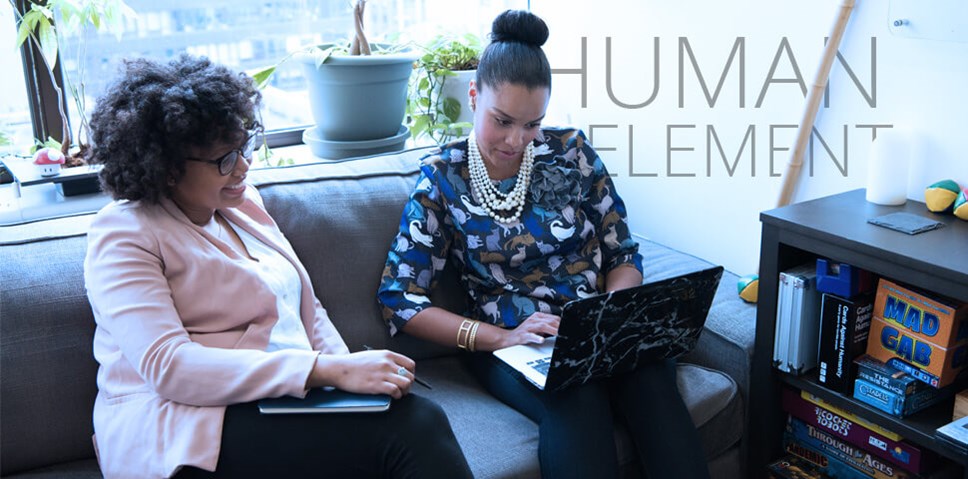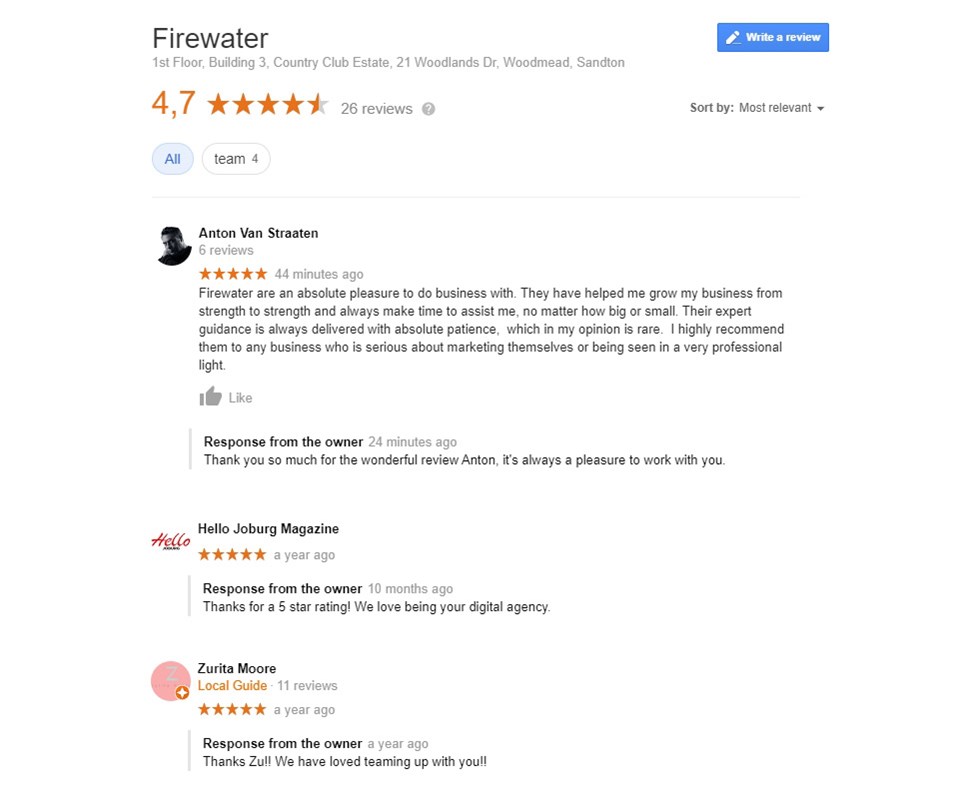If you don’t have good relationships with your clients they’ll drop your company fast. Just as fast as that guy driving on the N1 in his Audi TT.
Good relationships mean happy clients, and if working with your company is a bad experience, others will know about it: according to Zendesk, 95% of customers tell others about a bad experience, while 87% share good experiences.
At Firewater, client-agency relationships are based on a few important factors, like:
- Trust and open communication. (Unlike Eskom, we don’t leave our clients in the dark if there’s a problem)
- A personal element. (We make an effort to get to know the client as a person, not just a business transaction)
- Reassurance and no excuses. (The client knows we will always deliver to high standards – no ifs or buts)
- (We guide our clients and explain things, so they’re not 100% reliant on us – we’ll explain this further on)
1. If a client likes you, they’ll come back. If they don’t, they won’t
To borrow from author of CRM at the Speed of Light, Paul Greenberg: “If a customer likes you and continues to like you, they will do business with you. If they don’t, they won’t.”
It’s as simple as that.
“Having a good relationship with each of your clients is essential – it’s even more important than strategy or price points. If the relationship isn’t there, a client won’t come back,” reiterates Marselle, Firewater’s FIRETHINKER.
Marselle is responsible for strategy and account management; she’s a people’s person and she’s a bit obsessed with unicorns. No one in the office understands her unicorn fascination, although we gave her a plush unicorn at the year-end function – which subsequently got left in an Uber. But we digress.

“When Mark [Firewater’s CEO] and I go to a meeting with a client, we never immediately talk business,” says Marselle.
“We try be less formal, as some people go in really hard when they’re meeting for business. We take the time to learn a little bit about the person we’re dealing with, and it makes a massive difference.”
2. Clients are people
“It’s all about how you make people feel. If you actually take the time to remember that it’s a kid's birthday, or someone was going in for an op and you pop them a mail, it shows that you actually give a damn,” says Mark.
Good client relationships are relatively easy to achieve – if you put in the effort to remember your engagement with clients, that is. You don’t need to have a stellar memory, either, just make some quick notes – mental or otherwise.
“If you can give someone just a little bit more than everyone else gives them it goes a long way,” says Mark.
“The reason it's so important is because when everything's going well it's great, but if things go south it's a lot easier to fix a problem when there's an existing relationship. If there's no relationship it's over.”
In Mark’s experience, if there's a relationship there's an understanding from the other party, and they'll be more forgiving. And if you understand the context of the person you're dealing with, you'll probably handle them differently.
“If you know someone has a sick child and you're trying to get stuff out of them you will probably take a different approach. But you wouldn't know that unless you have the context. There needs to be a human element; it's not just about professional understanding, it's also about soft skills.”

3. It’s all about T R U S T
Educating our clients is an essential part of customer service at Firewater – we look at our clients’ needs holistically. Let’s say a client wants a website: of course we’ll build a website, but we’ll ask the client to consider other, related aspects – like SEO and having a content marketing strategy, or how they can best optimise their site for lead generation.
“We’ll sit down with the client and ask, ‘How do we get people to view the website? If people don’t know about it, what then?’” says Marselle.
“It’s all about reassuring the client that you’re the expert, so they trust your advice; if trust is established then they are more inclined to listen to you.”
Historically, marketing agencies like their customers to be dumb. Because why? So they can bill them more. These days everything is tracked and measurable – thanks to digital. This is a good thing, but sometimes clients don’t understand what they’re tracking or measuring to begin with.
“A client can be very happy when they’re given monthly reports, but if they don't understand what they’re looking at they can't hold the agency accountable,” says Mark.
“Or reports get embellished by the agency, or, what’s being measured doesn’t even align with what was originally set out in the strategy,” adds Mark. “If the client doesn’t know what is being measured, how will they know if the objectives have been met or not? There’s no accountability, which means there’s no trust.”
“We make sure the client understands what we're trying to do, and show them the good and bad, and be honest and transparent. Only then do you remove barriers, and they'll trust you,” adds Mark.
4. The chemistry needs to be right
Just like with a Tinder date, client chemistry is huge. Sometimes there's a mismatch – for example, if the agency is too leftfield and the client is corporate, or there could even be a personality clash.
“It's about understanding that upfront and making sure that you mitigate that as quickly as you can,” says Mark.
Or sometimes a client refuses to accept any accountability for the role that they play when something goes wrong, or they don’t respect the agency’s processes.
“A blame game doesn't work – you need clients that also respect the agency and understand that hiccups do happen. Clients who are hunting for blame rather than resolution are the wrong clients,” adds Mark. “But it's the agency's responsibility to keep tabs on all of the relationships, and to mitigate when needed.”
One of the biggest challenges in the digital marketing game is that many people are afraid of digital, and they use their preconceived notions to create barriers to prevent the agency from doing good work.
“At the end of the day, a client must feel comfortable enough with their agency so that a) the agency makes life easier for them, and b) the agency makes them shine,” says Mark.
“A client’s value system and their company culture need to also align with the agency to ensure better relationships.”

Bonus point: Good client relationships WILL pay off
We take client satisfaction very seriously – and you don’t have to take our word for it, either. Just have a look at some of these:

A good client-agency relationship isn’t just a nice to have – it’s gold. According to latest HubSpot research, 93% of customers are likely to make repeat purchases with companies who offer excellent customer service, while a HubSpot survey revealed that 80% of respondents said they’d stopped doing business with a company because of a poor customer experience.
Happy clients will pay off, but it’s a matter of putting in the effort – like offering a service with a human element, and educating clients so they’re not totally reliant on you. Trust, transparency, and the right fit all go a long way, too.
It’s simple: a good client-agency relationship will make people want to do business with you.
And repeatedly come back.
Looking to team up with a digital marketing agency that makes you feel good? Contact us. Or are you a client (or previous client) who’d like to share your five-star Firewater experience via a Google review? Go here.




